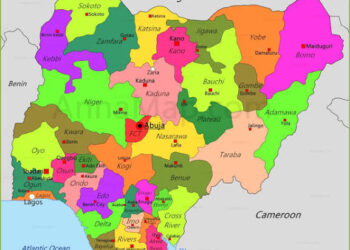Amid rising poverty and impoverishment ocassioned by astronomical rise in the prices of food stuff and other essentials of life, the nation’s burea of statistics (NBS) says
consumer price index (CPI), a measurement of the rate of change in prices of goods and services, has declined to 17.75% in June from 17.93 recorded in May 2021.
The ‘Consumer Price Index Report for June’ released by NBS on Friday, means that the prices have continued to increase in June 2021. However, it was at a slower rate than it did in the last month.
The implication is that prices of food rose in the month under review but at a little slower pace than what was recorded in May 2021.
But investigations and survey by our correspondents show that contrary is the case as more Nigerians are dying of hunger due to inability to buy basic food stuff due to prohibitive prices.
“The CPI measures the average change over time in prices of goods and services consumed by people for day-to-day living,” the NBS noted in its report.“The construction of the CPI combines economic theory, sampling and other statistical techniques using data from other surveys to produce a weighted measure of average price changes in the Nigerian economy.”
The country’s Headline Index, on a month-on-month basis, moved by 1.06% in June 2021. This figure was 0.05 percentage points higher than what was recorded in May 2021 – pegged at 1.01%.
There was also an increase in the urban inflation rate as it jumped by 18.35 %(year-on-year) in June 2021 from May 2021’s 18.51%. On the other hand, the rural inflation rate moved by 17.16% in June 2021 from 17.36% in May 2021.
The NBS report equally noted that the composite food index increased by 21.83 % in June 2021. This is against the 22.28% reported in May 2021.
Giving an account of
Shehu Ismaila Gbadebo, Reuters said Gbadebo has worked as a barber for two decades. The money he made at his rented stall in a bustling suburb of Nigeria’s megacity, Lagos, used to be plenty for him to pay bills and set aside some savings. Now, he relies on donated food and sometimes skips meals to feed his family.”The money I have is not enough for what we need,” Gbadebo, 38, told Reuters after tending a customer.
Millions of Nigerians like Gbadebo, who were once on solid financial footing, can no longer reliably feed themselves or their families. According to Reuters, roughly 18% of households in Nigeria have at least one adult who does not eat for an entire day at a time, compared with 6% before the pandemic, according to the World Bank. Inflation is near an all-time high, and food prices account for almost 70% of the rise.
The U.N. food agency has warned that food import costs worldwide are expected to surge to records this year, as price increases for nearly all agricultural commodities and a rally in energy prices boost production and shipping costs.
But in Nigeria, galloping inflation is combining with the impact of a teetering economy, rising unemployment and insecurity in farming regions to pull even the formerly middle class into dire straits.
Some experts warn of worsening malnutrition and the potential for unrest.
“What we are experiencing in Nigeria is different from what is being experienced all over the world,” said Idayat Hassan, director of the Abuja-based think-tank Centre for Democracy and Development, adding that the nation’s limited social safety net left millions with little help.
“Crime is actually skyrocketing on daily basis, because people are trying to make ends meet.”










